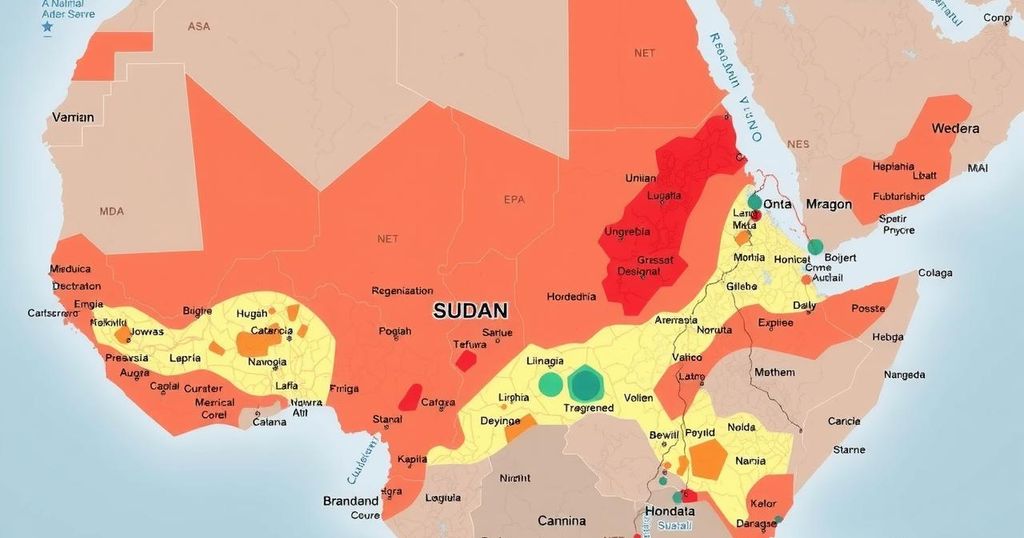Sudan’s Escalating Famine Crisis Amid Ongoing Civil War

Sudan is experiencing a worsening famine affecting five regions, with 24.6 million people needing urgent food aid due to the civil war between the army and RSF. The UN-backed Famine Review Committee warns of a potential greater crisis if the conflict persists. Recent violence has led to severe humanitarian impacts, with significant loss of life reported. Sudan’s government has disengaged from the IPC, accusing it of unreliable reporting.
Sudan is currently facing a deepening famine crisis as a consequence of the ongoing civil war that has ravaged the country for the past 20 months. An independent panel of food security experts has reported that the famine has expanded to five distinct regions, impacting approximately 24.6 million individuals, which constitutes nearly half of Sudan’s population who are in dire need of humanitarian assistance. The hunger crisis is exacerbated by the power struggle between the Sudanese army and the paramilitary Rapid Support Forces (RSF), which escalated after their joint coup in 2021 and led to full-scale conflict in 2023. This ongoing violence has resulted in one of the most severe humanitarian disasters globally, prompting warnings from the UN-backed Famine Review Committee (FRC) of a potential “greater catastrophe” if the conflict persists.
The FRC, which is associated with the Integrated Food Phase Classification (IPC), has designated famine conditions in various camps including Zamzam, Abu Shouk, and al-Salam in the Darfur region, as well as two areas in South Kordofan. Their report illustrates that famine signifies not just a scarcity of food, but a catastrophic failure of the essential systems and resources that support survival, indicating a profound breakdown of health, economic livelihoods, and social structures, which leaves communities in a state of extreme desperation. Furthermore, the FRC anticipates that five additional regions in Darfur may encounter famine conditions by May, posing a risk of extension to 17 more areas.
Both Darfur and South Kordofan have witnessed notably severe violence, leading to numerous civilian casualties and widespread abuse. Recent statements from U.S. Special Envoy for Sudan, Tom Perriello, suggest that the conflict may have claimed the lives of up to 150,000 people. On the governmental side, Sudan’s military-controlled administration has dismissed cooperation with the IPC, citing an accusation of unreliable reporting that purportedly undermines Sudan’s sovereignty and dignity. The plight of the Sudanese people highlights the urgent need for substantial international intervention and support.
The ongoing civil war in Sudan has had devastating consequences for the civilian population, triggering a humanitarian crisis characterized by widespread famine. The conflict originated from a power struggle between the Sudanese army and the RSF following their joint coup in 2021, which escalated into violence in early 2023. This instability has severely disrupted agricultural activities and basic life-sustaining services, plunging millions into desperate need for food assistance. The situation is critical, with independent experts and UN agencies ringing alarm bells about impending famine in several regions. Understanding this backdrop is vital in grasping the urgency of the situation and the complexities surrounding humanitarian efforts.
In summary, the worsening famine crisis in Sudan is directly attributable to the protracted civil war, which has led to devastating humanitarian consequences for the population. With millions in urgent need of food assistance and the potential for famine conditions to spread further, the international community’s engagement and intervention are critical. The growing violence and instability not only threaten public health and livelihoods but also the basic dignity of those affected by this humanitarian disaster.
Original Source: www.bbc.com








